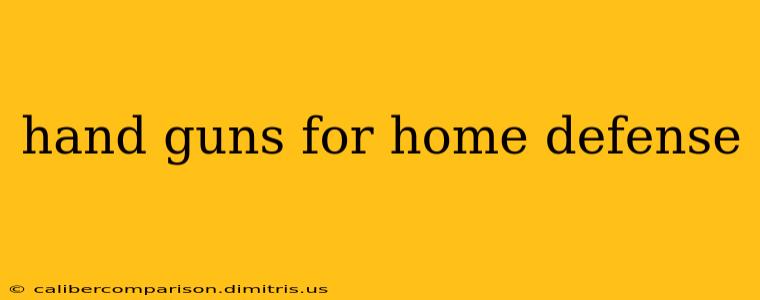Choosing a handgun for home defense is a serious decision, demanding careful consideration of various factors beyond just firepower. This guide delves into the key aspects to help you make an informed choice, prioritizing safety and effectiveness. Remember, responsible gun ownership includes rigorous training and a deep understanding of relevant laws.
Key Considerations When Selecting a Home Defense Handgun
Several critical factors influence the suitability of a handgun for home defense. Ignoring these could compromise your safety and effectiveness in a critical situation.
1. Caliber: Balancing Power and Control
The caliber debate is often heated, with no single "best" answer. Larger calibers (.357 Magnum, .44 Magnum) offer greater stopping power, but come with significant recoil, potentially hindering accuracy under stress. Smaller calibers (9mm, .40 S&W, .45 ACP) provide manageable recoil, allowing for faster follow-up shots. The key is finding a balance that suits your physical capabilities and proficiency. Consider your ability to consistently hit your target even under extreme pressure.
2. Reliability: Your Gun Must Function Under Pressure
Reliability is paramount. A malfunctioning firearm during a home invasion is catastrophic. Choose a reputable manufacturer with a proven track record of producing reliable handguns. Regular cleaning and maintenance are crucial, ensuring your firearm functions flawlessly when you need it most. Consider firearms with a proven history of performance in various conditions.
3. Capacity: Rounds Available in a Single Magazine
Higher capacity magazines (15 rounds or more) offer a greater number of defensive rounds, potentially extending your engagement time. However, carrying extra magazines might be crucial to ensure you have sufficient ammunition. Balance your chosen firearm’s magazine capacity with your ability to swiftly reload, a skill best honed through consistent practice.
4. Ergonomics and Grip: Comfortability and Control
A comfortable and secure grip is essential for accuracy and control. The handgun should fit your hand naturally, allowing for consistent and comfortable shooting. Consider hand size, grip texture, and overall feel to ensure proper handling and minimize fatigue during extended use.
5. Sights: Accurate Targeting in Low-Light Conditions
Sights play a crucial role in accurate shooting, particularly in low-light conditions often associated with home defense situations. Night sights, with self-luminous inserts, are highly beneficial in these scenarios. Consider the sight type (iron sights, red dot sights) that best suits your shooting style and preferences.
6. Ammunition Selection: Choosing the Right Rounds
Ammunition choice is as critical as the firearm itself. Self-defense ammunition is designed to maximize stopping power and minimize overpenetration. Consider expanding rounds that increase the bullet's diameter upon impact. Always practice with the same ammunition you intend to use for self-defense.
Popular Handgun Choices for Home Defense
While no single handgun is universally superior, several models consistently rank highly for home defense. Researching these options, considering the factors above, and hands-on experience at a shooting range will help you determine the best fit for your needs. This is not an exhaustive list and should not be interpreted as an endorsement:
- Glock 17/19: Popular for reliability, high capacity, and ease of use.
- Smith & Wesson M&P 9: Another reliable and versatile option known for its ergonomics.
- Sig Sauer P320: Modular design allows for customization to fit individual preferences.
Beyond the Firearm: Training and Responsible Gun Ownership
Selecting the right handgun is just one piece of the puzzle. Comprehensive training is absolutely essential. Seek professional instruction from qualified instructors on safe gun handling, marksmanship, home defense tactics, and legal aspects of self-defense. Regular practice is crucial to maintain proficiency and build muscle memory. Familiarize yourself with your local laws regarding self-defense and the use of firearms.
Remember, responsible gun ownership involves a commitment to safety, training, and legal compliance. This guide serves as a starting point, prompting further research and discussion with experienced professionals. Your safety and the safety of your family depend on it.

